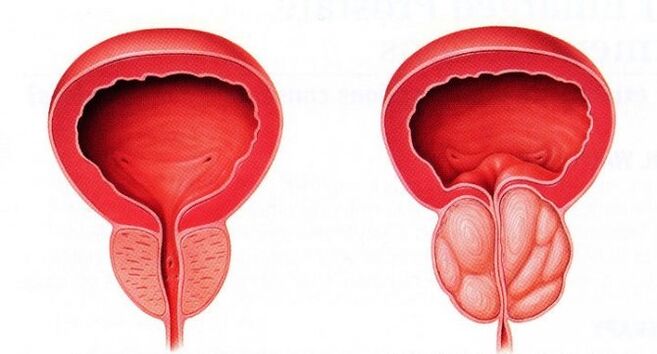
Among men aged 30 to 50 years, the most common disease is chronic prostatitis.The disease is characterized by frequent exacerbations and is difficult to treat.
Treatment of prostatitis
Is chronic prostatitis curable?- concerns many men of reproductive age.Unfortunately, over the years, more and more men under 30 are turning to urologists with this problem.
Most often, the cause of this disease is bacteria that are sexually transmitted, for example, Trichomonas.A sedentary lifestyle also plays a significant role.Prostatitis is a rather dangerous disease.It can lead to infertility or the appearance of malignant tumors.It is rare to completely get rid of the disease.
How does the disease manifest itself?
For many years, a man may not even suspect that he has chronic prostatitis.The disease may be asymptomatic.Occasionally, mild pain in the genitals may occur, radiating to the sacrum and rectum.You can also observe slight discharge from the urethra.
Most men do not take any action when experiencing such symptoms, and chronic prostatitis can cause cystitis or pyelonephritis.If the disease is not treated, problems with erection may soon appear.
Is the disease treatable?
The question of the effectiveness of treatment is very relevant, since chronic prostatitis causes not only physical inconvenience, but also traumatizes the psyche of men.
The course of treatment is prescribed for each patient individually and includes a whole range of therapeutic manipulations.To get rid of the disease, the following methods are used:
- Treatment with medications;
- Physiotherapy;
- Manual therapy.
Treatment also includes additional studies, including:
- Consultation with a psychologist, endocrinologist, cardiologist;
- Study of hormonal status;
- Ultrasound of the genitourinary system.
Treatment of chronic prostatitis
Treatment of the disease begins with a complete change in lifestyle.It is necessary to restore blood circulation in the pelvic organs.For this purpose, physical therapy is prescribed.You also need to walk every day.It is very important to have sex regularly.Abstinence may harm treatment.
The effectiveness of therapy is influenced by the patient's nutrition.For men suffering from chronic prostatitis, following a special diet plays an important role.You need to completely give up alcohol.The daily diet should include dairy and plant products.
The permissible daily fluid intake should be at least two liters.This is necessary to flush the urinary tract.
Fatty, salty and smoked foods have an irritating effect on the prostate gland, so you should avoid them.It is advisable to eat more zinc-containing foods.
Following these recommendations will help avoid exacerbation of the disease and promote recovery.
This is the preparatory stage of treatment.Next comes the main course, during which medications are used.
Step-by-step treatment allows you to monitor its effectiveness and make necessary changes.
Drug treatment
Antibiotics are almost always prescribed for the treatment of chronic prostatitis in men of any age.Correctly selected drugs allow you to:
- Eliminate the inflammatory process;
- Speed up recovery;
- Reduce intoxication.
Drug treatment for men involves taking several medications.
- If the cause of chronic prostatitis is bacteria, antimicrobial programs are prescribed.Treatment is carried out taking into account the sensitivity of a particular pathogen to the drug.What drugs to use, the daily dose, frequency of administration and duration of treatment are determined by the doctor.
- Recently, drugs that were not previously used for this purpose have been used to treat chronic prostatitis, namely alpha-1 adrenergic blockers.
- If the pathogen is not identified, anti-inflammatory therapy is still necessary.
- In order to strengthen the immune system, vitamins are prescribed.
Herbal treatment is often added to drug treatment.Infusions of burdock root, asparagus, and chestnut are recommended.Physiotherapeutic methods used for chronic prostatitis include reflexology, thermotherapy, prostate massage, and acupuncture.
Antibiotics for chronic prostatitis
Antibacterial drugs are prescribed if prostatitis is caused by pathogens.The choice of drug should be approached very seriously, since not all medications accumulate in sufficient quantities in the prostate tissue.
Fluoroquinolones
Drugs in this group are highly concentrated in prostate tissue.They begin to act gradually throughout the day, maintaining a uniform concentration of the drug.
Fluoroquinolones are drugs that are used primarily in the treatment of men with chronic prostatitis, only if the patient does not suffer from tuberculosis.
Tetracyclines
Effectively cope with chlamydia and mycoplasma.Therefore, they are prescribed if the cause of the disease is sexually transmitted diseases.
Macrolides
Such drugs are prescribed infrequently, as they have been little studied.But you shouldn’t completely exclude them.They act quite well on gram-positive bacteria, chlamydia, and are relatively non-toxic.
Antibiotics can only help if the patient completes the entire course, which lasts about two weeks.After its completion, the doctor assesses the patient’s condition.Most often, positive results are observed.It is rarely possible to completely cure chronic prostatitis.Most often, specialists achieve long-term remission, which can last for years.
Prevention
To prevent exacerbation, you must follow some recommendations:
- Do not allow the body to become overcooled.It is advisable to avoid sitting on a cold surface.An excellent option against exacerbations would be hardening the body;
- You can’t go to the toilet for a long time;
- If you need to be in a sitting position for a long time, then you need a short break every hour, during which you can walk and warm up;
- Moderate physical activity.Morning exercises and walking will be enough;
- Moderate intimate life.Interrupted or too prolonged sexual intercourse should be avoided;
- Fighting constipation;
- It is advisable to avoid trauma to the perineum;
- You need to completely stop drinking alcohol during an exacerbation and not abuse it during a period of remission;
- If possible, avoid stress and nervous tension;
- Have a preventive examination with a urologist several times a year.
These simple recommendations will help improve your health and avoid exacerbations of chronic prostatitis.





































